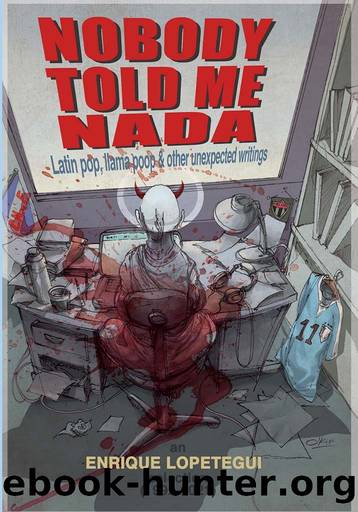Nobody Told Me Nada by Enrique Lopetegui

Author:Enrique Lopetegui
Language: eng
Format: epub
Publisher: Yulelé Media
Published: 2022-09-15T00:00:00+00:00
Santana: In Metraton We Trust
(San Antonio Current, September 6, 2011)
Has everything been invented in music? Yes and no. You can always trace what anyone is doing to an earlier master, an earlier sound. But every decade has new waves of music that change the musical map thanks to the inspiration of people who listen to their own muse. Or their own angel.
On August 16, 1969 (the second of the three days of the original Woodstock), Carlos Santana and his band stopped the show with a performance that catapulted him to Guitar God status. And even though the mix of congas, electric guitar, and Afro Latin rhythms (African, if you ask him) had been toyed with in different countries, none had the power, skill level, and influence of that fierce rendition of âSoul Sacrifice.â But then and now, Santana refuses to take credit.
âGod invented everything, we discovered,â he told the Current on the phone, back and forth in Spanish and English, days before his Sunday show at AT&T Center. âI just always kept my ears open.â
Heâs touring for Guitar Heaven: The Greatest Guitar Classics of All Time, an album where he and guests cover songs like âLittle Wingâ (sang by Joe Cocker, another Woodstock veteran), âCanât You Hear Me Knockingâ (Scott Weiland), and âWhole Lotta Loveâ (Chris Cornell). After the tour ends, heâll release Shape Shifter, an all-instrumental album of mostly originals that, judging from the quality of its title song, is the most challenging and least commercial Santana album since the â70s.
âIâm finally ready to do something like that,â he said. âNo singers, just the band and my guitar.â
Santana has kept busy ever since the San Francisco tardeadas in the â60s opened his eyes and ears to a musical universe he internalized with integrity. Heâll never forget the day he saw a mariachi orchestra, a salsa band, and a rock group playing in three different sections of a park in the Bay area.
âPeople would choose who to listen to, but I heard all three at the same time,â he said. âThen I began to integrate B.B. King with Tito Puente, Cuco Sánchez with Ray Barreto, and Mongo SantamarÃa with Miles Davis. People said that it was something new, but for me it was only natural.â
The most popular names of the era (Cream, Jimi Hendrix, Led Zeppelin, the Doors) were basically playing the blues, only increasingly louder. They were taking inspiration from the same blues and rock ânâ roll artists admired by the young Santana. âThe only thing that was different was that I began to listen more to Tito Puente, Miles Davis, and [John] Coltrane. I began to integrate the thing with more latitude. Instead of being a one-trick dog, I learned the whole book.â
But he has always known where it all comes from. He not only refuses to take credit for it â he doesnât want anyone besides the true owners to claim ownership either.
âNinety-nine percent of my music comes from Africa,â he said. âSorry, Puerto Ricans, and sorry Cubans, who think they invented it.
Download
This site does not store any files on its server. We only index and link to content provided by other sites. Please contact the content providers to delete copyright contents if any and email us, we'll remove relevant links or contents immediately.
Call Me by Your Name by André Aciman(20437)
Ready Player One by Cline Ernest(14586)
How to Be a Bawse: A Guide to Conquering Life by Lilly Singh(7438)
Wiseguy by Nicholas Pileggi(5711)
The Kite Runner by Khaled Hosseini(5134)
On Writing A Memoir of the Craft by Stephen King(4893)
Audition by Ryu Murakami(4891)
The Crown by Robert Lacey(4764)
Call me by your name by Andre Aciman(4648)
Gerald's Game by Stephen King(4612)
Harry Potter and the Cursed Child: The Journey by Harry Potter Theatrical Productions(4468)
Dialogue by Robert McKee(4354)
The Perils of Being Moderately Famous by Soha Ali Khan(4194)
Dynamic Alignment Through Imagery by Eric Franklin(4179)
Apollo 8 by Jeffrey Kluger(3672)
Seriously... I'm Kidding by Ellen DeGeneres(3607)
The Inner Game of Tennis by W. Timothy Gallwey(3604)
How to be Champion: My Autobiography by Sarah Millican(3571)
Darker by E L James(3493)
